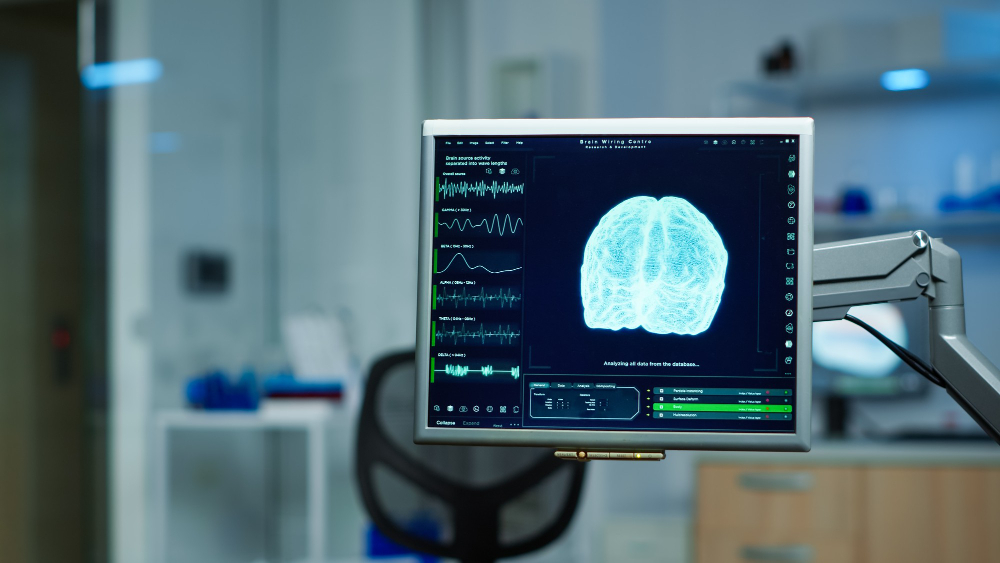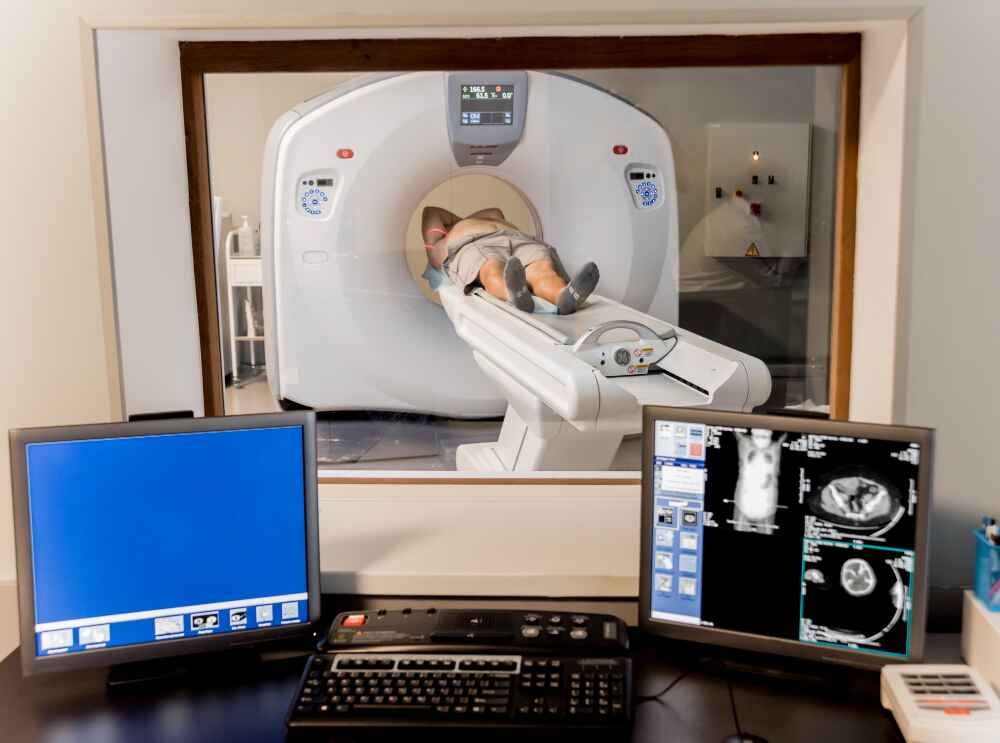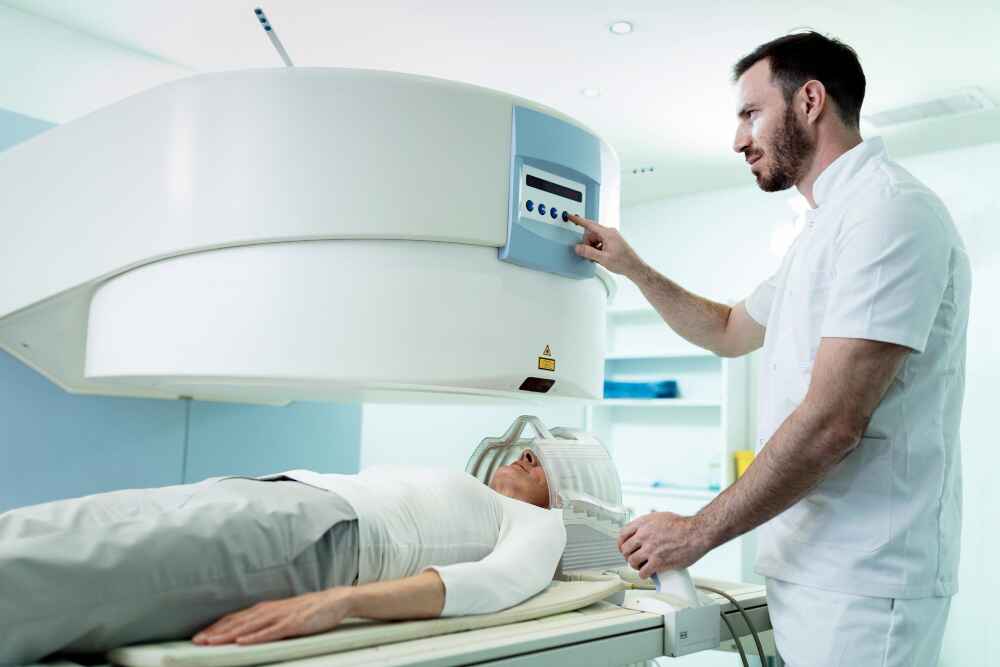Book on Whatsapp
9892101616
Championing Brain Health Awareness: 6 Tips For Optimum Brain Health
Radiology
Sat Jun 15 2024
A leading health and wellness organization is spearheading a new program designed to empower individuals with strategies for promoting brain health. It is aiming to potentially reduce the risk of cognitive decline. This initiative coincides strategically with Alzheimer's and Brain Awareness Month.
"We are dedicated to providing actionable steps that can significantly enhance cognitive function and potentially mitigate the risk of cognitive decline as we age," asserted a qualified program representative specializing in nutrition and wellness.
The program outlines six core practices to combat Alzheimer's disease and other forms of dementia.
Dietary Intervention for Optimal Brain Function
The program emphasizes a well-balanced diet rich in fruits, vegetables, whole grains, lean protein sources, and healthy fats. Consumption of omega-3 fatty acids, prevalent in fish, nuts, and seeds, is encouraged due to their established cognitive benefits. Conversely, processed foods, sugary snacks, and excessive alcohol intake are discouraged. This dietary approach aligns with the MIND diet, which the program will explore in more detail later this month.
Physical Activity for Enhanced Cognitive Performance
Regular exercise is an essential component of brain health. It demonstrably improves blood flow to the brain and reduces the risk of chronic conditions such as hypertension and diabetes, both of which can contribute to cognitive decline. The program recommends aiming for at least 30 minutes of moderate-intensity exercise most days of the week, complemented by strength training exercises.
Cognitive Stimulation to Maintain Mental Acuity
The program underscores the importance of engaging in activities that challenge the brain, such as puzzles, brain teasers, reading, acquiring new skills, or playing musical instruments. These activities have been shown to aid in maintaining cognitive sharpness and potentially reduce the risk of dementia. Lifelong learning is a cornerstone of this concept, promoting neuroplasticity – the brain's ability to adapt and rewire itself in response to new experiences.
Prioritizing Sleep for Optimal Brain Function
Adequate sleep is essential for optimal brain function and overall well-being. The program recommends striving for seven to nine hours of quality sleep nightly. Establishing a relaxing bedtime routine and creating a comfortable sleep environment are emphasized to promote restorative sleep.
Social Connections for Enhanced Emotional Well-being
Strong social connections are crucial for brain health. The program encourages maintaining connections with family, friends, and members of the community. Social interaction has been demonstrably linked to reduced feelings of loneliness and isolation, which are associated with cognitive decline.
Regular Health Checkups for Early Detection
Routine health checkups are vital for monitoring brain health. The program advises consulting with a healthcare provider for cognitive function assessments and screenings for risk factors associated with Alzheimer's disease and dementia. It further encourages individuals to discuss any concerns they may have regarding their memory, thinking, or behavior. Early detection and intervention are key to managing cognitive decline and maximizing quality of life.
Individuals can take proactive steps to safeguard their brain health and potentially mitigate the risk of cognitive decline. June is Alzheimer's and Brain Awareness Month. Purple is designated as the official color of the Alzheimer's movement. Let everyone wear purple throughout June to raise awareness about brain health.
Related Tests
Related Packages
Related Blogs

Radiology
Everything You Should Know About Head MRI and Cost
Magnetic Resonance Imaging (MRI) is a powerful diagnostic tool that helps medical professionals visualize the internal structures of the body in detail. A Head MRI is a non-invasive imaging procedure that creates detailed images of the brain, skull, blood vessels, and surrounding tissues. It is widely used to detect and evaluate various neurological conditions, injuries, and abnormalities.
What is a Head MRI?
A Head MRI uses strong magnetic fields and radio waves to generate images of the brain and other structures inside the head. Unlike X-rays or CT scans, it does not involve ionizing radiation, making it safer, especially for repeated use. The procedure usually takes around 30 to 60 minutes and may involve the use of contrast dye (gadolinium) to enhance the visibility of certain areas.
Why is a Head MRI Recommended?
Doctors recommend a head MRI for various reasons, including:
- Persistent Headaches or Migraines: To rule out underlying neurological causes.
- Seizures: To identify any abnormalities in the brain tissue.
- Stroke Symptoms: To detect signs of stroke or mini-strokes (TIAs).
- Traumatic Brain Injury: To assess the extent of damage following an accident or injury.
- Brain Tumors: To locate and evaluate tumors or cysts.
- Multiple Sclerosis (MS): To detect and monitor lesions or inflammation in the brain.
- Infections: Such as encephalitis or meningitis.
- Dizziness or Vision Problems: When symptoms point to a neurological cause.
How is a Head MRI Performed?
The patient lies on a movable table that slides into the MRI scanner a large, cylindrical machine. During the scan, it is crucial to stay still to obtain clear images. The procedure is painless, although the machine may make loud thumping or tapping sounds. Patients with claustrophobia may be given a mild sedative. If contrast is required, it is injected through a vein in the arm before or during the scan.
Safety Considerations
While MRIs are generally safe, they are not suitable for everyone. Individuals with pacemakers, metal implants, or certain other medical devices may not be eligible for an MRI. It’s essential to inform the radiologist about any medical conditions, allergies, or pregnancy before the procedure.
Cost of a Head MRI in India
The cost of a head MRI can vary significantly based on location, the type of facility (private vs. public), and whether contrast dye is used. Some factors influencing the cost include:
- City or Region: Tier 1 cities usually have higher costs.
- Hospital or Diagnostic Center: Premium centers may charge more.
- Type of MRI Machine: High-resolution 3 Tesla MRIs may cost more than standard 1.5 Tesla machines.
- Insurance Coverage: Some health insurance policies cover the cost of diagnostic tests, including MRIs.
A Head MRI is an invaluable tool in modern medicine, offering detailed insights into the brain and related structures. While the procedure is safe and non-invasive, it should only be performed upon a doctor’s recommendation. Knowing the approximate cost and process helps patients make informed decisions about their health and diagnostics.
If you are experiencing symptoms such as persistent headaches, memory loss, or neurological changes, consult your healthcare provider. Timely imaging can lead to early diagnosis and better treatment outcomes.
For accurate and affordable MRI scans , visit the nearest Manipal TRUtest center

Radiology
The Importance of MRI Scans in Detecting Health Issues
Medical imaging has transformed healthcare, and MRI (Magnetic Resonance Imaging) stands out as one of the most important tools for early and accurate diagnosis. An MRI scan uses powerful magnets and radio waves to create detailed images of the inside of the body, without the use of radiation. This helps doctors identify health problems quickly and plan the best treatment for their patients.
What Makes MRI Scans So Valuable?
Unlike X-rays or CT scans, MRI provides highly detailed pictures of soft tissues, organs, and even the nervous system. It is especially useful in detecting issues in the brain, spine, joints, heart, and internal organs. When symptoms are unclear, an MRI can uncover hidden problems that other scans might miss. This makes it a trusted choice for doctors who want a clearer view of what’s happening inside the body.
At Manipal TRUtest, advanced MRI services ensure that patients get accurate and reliable results quickly, helping them start treatment without unnecessary delays.
Common Health Issues Detected by MRI
MRI scans are used to diagnose a wide range of conditions, such as:
- Brain and spinal cord issues: MRI is excellent at detecting brain tumors, strokes, multiple sclerosis, and spinal cord injuries.
- Joint problems: If you have unexplained joint pain, an MRI can show damage to ligaments, cartilage, and muscles.
- Heart conditions: Doctors use MRI to assess the structure and function of the heart, helping to diagnose heart diseases early.
- Organ health: MRI scans can spot liver diseases, kidney problems, and abnormalities in other internal organs.
By offering clear images, MRI helps in creating the right treatment plan, making recovery faster and smoother.
When Should You Consider an MRI?
Doctors usually recommend an MRI when they need a deeper understanding of a health issue. You may need an MRI if:
- There is a need to monitor known conditions like tumors or injuries.
- You experience unexplained symptoms that cannot be diagnosed with other imaging tests.
- You have persistent headaches, seizures, or dizziness.
- You are suffering from chronic joint or back pain.
Choosing a trusted center like Manipal TRUtest for your MRI scan ensures that you are in safe hands, receiving quality care at every step.
How to Prepare for an MRI Scan
Preparing for an MRI scan is usually rather straightforward. You may be asked to remove metal items such as jewellery before the scan. If you have any metal implants or pacemakers, let the technician know beforehand. You may receive a contrast dye to enhance the imaging during the scan. The MRI scan is painless, and you will usually be able to go home shortly thereafter.
At Manipal TRUtest , the medical team guides you through every step, making sure you are comfortable and well-informed before and after the procedure.
The role of MRI scans in modern medical diagnosis is substantial. An MRI scan has the potential to find serious health issues quickly and even save lives. If it is a brain condition, a heart issue, or pain with an unknown origin, an MRI provides the clarity needed to move forward with confidence. Why not trust a reliable service to perform the MRI? Take the time to be proactive with your health, and go to Manipal TRUtest for accurate MRI imaging.

Radiology
When and Why You Might Need an Abdominal Scan
The abdomen is where important organs such as the liver, kidneys, pancreas, gallbladder, and intestines all reside. When something doesn't feel right in this area, doctors often recommend an abdominal scan to figure out what is going on inside the abdomen. These scans are safe, quick, and can help provide important information for the next step in your path to better health.
What is an Abdominal Scan?
An abdominal scan is an imaging test that allows doctors to view organs and tissues inside the belly. It can be done by different procedures such as ultrasound, CT scan and MRI. Each technique has its own benefits, depending on what the doctor is looking for. The scans are quick and painless, and can sometimes identify problems early on before they have developed into symptoms.
When Might You Need an Abdominal Scan?
There are many reasons a doctor might recommend an abdominal scan. Some of the most common situations include:
1. Unexplained Pain
If you are experiencing pain in your abdomen that does not go away, a scan can help identify the cause. It could be due to gallstones, liver issues, infections or kidney stones,
2. Digestive Problems
Persistent issues like nausea, vomiting , and changes in bowel habits may require a closer look. An abdominal scan can reveal if there are any blockages, swelling, orabnormalities in the digestive organs.
3. Injury or Trauma
After an accident or a fall, an abdominal scan is often done to check for internal bleeding and organ damage. Even if there are no external injuries, it is important to ensure that the internal organs are safe.
4. Suspected Infections
Infections in the abdomen, such as a reddened appendix or an abscess, which can be dangerous if not treated quickly. A scan helps detect these circumstances so that the right treatment can begin without delay.
5. Monitoring Existing Conditions
For people already diagnosed with conditions like liver disease, kidney problems, and cancer, regular abdominal scans are important. They help monitor the disease’s progress and assess how well the treatment is working.
6. Checking for Tumors or Growths
An abdominal scan can spot abnormal growths like tumors, lumps, and cysts. Early detection makes it easier to manage these conditions effectively.
Different Types of Abdominal Scans
Depending on the situation, your doctor may choose one of the following scans:
- Ultrasound: Common for checking gallbladder, liver, and kidneys. It’s quick and uses sound waves instead of radiation.
- CT Scan: Provides more detailed images and is often used to spot injuries, infections, or tumors.
- MRI Scan: Gives very detailed pictures, especially useful for soft tissues and blood vessels.
Each scan has its own benefits, and your healthcare provider will decide which one suits your needs best.
How to Prepare for an Abdominal Scan
Preparation depends on the type of scan. For ultrasounds, you might be asked to fast for a few hours beforehand. For CT or MRI scans, you may need to drink a contrast liquid or receive an injection to make certain areas clearer. Always follow the instructions given by the healthcare team to ensure accurate results.
An abdominal scan is a powerful tool that helps doctors see inside your body without surgery. Whether it’s unexplained pain, digestive troubles, or simply monitoring an ongoing condition, these scans play a key role in keeping you healthy. If your doctor recommends an abdominal scan, it is a step towards understanding your health better and taking timely action when needed.
